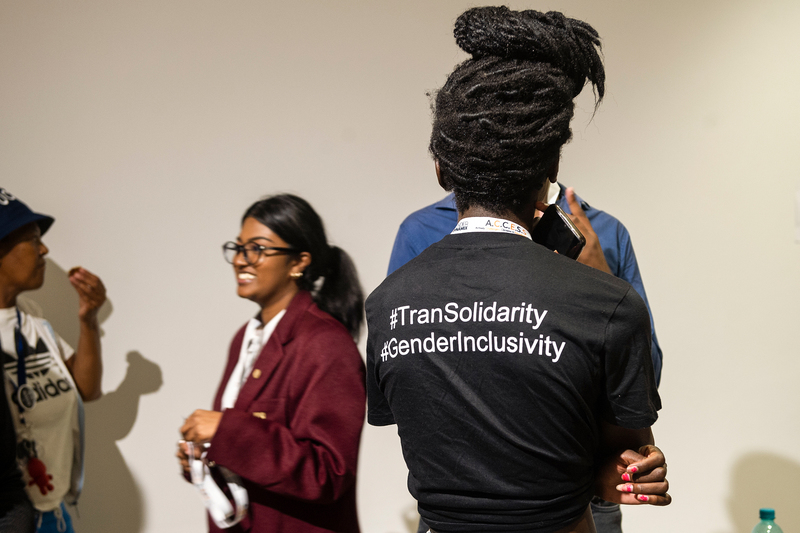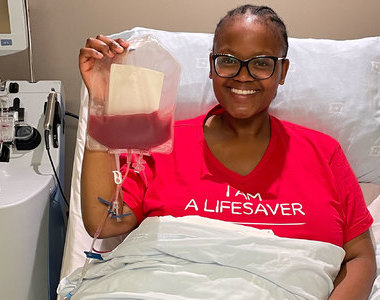Putting trans communities into transformation policies across SA campuses
21 April 2023 | Story Lisa Templeton. Photos Lerato Maduna. Voice Cwenga Koyana. Read time 7 min.
Hosted by the University of Cape Town (UCT), in a building selected for its availability of gender-neutral bathrooms, the Model Policy Framework for Inclusion of Trans and Gender-Diverse Students within Higher Education Institutions in South Africa was launched to help counter institutional challenges and administrative procedures.
At its heart is the welcome, inclusion, and mental and physical well-being of students who experience amplified vulnerabilities in a world set up for clear-cut (cis) heteronormativity.
This impacts everything from bureaucracy around gender identification and enrolment forms, through gender identity and names on class lists, within lecture halls and on graduation certificates, to bathroom and residence usage. It also includes access to appropriate healthcare, sporting codes and the potential of bullying, personal safety, and security responses.
While institutions of higher learning may be genuinely committed to transformation, the theme among speakers was the lack of true understanding, motivation and clear direction when it comes to the very specific needs of trans and gender-diverse students, who also lack representation when it comes to policy making.
“There is window dressing with a trans flag. This model policy framework is a push to take transformation seriously.”
“This framework gives a policy guideline, on paper, that is specifically geared to gender and sexual minorities, upon which institutions can model their own policies, giving those [who are] typically silenced a voice,” said Khanyisile Phillips, an education advocacy officer for Gender Dynamix, the founding trans-specific organisation in Africa.
“So often within institutions of higher learning, transformation has become a buzzword. There is window dressing with a trans flag. This model policy framework is a push to take transformation seriously.
Embracing inclusivity on a continent plagued by bias
“For us this is a very big moment,” said Liberty Matthyse, the executive director of Gender Dynamix, who herself faced discrimination and violence while a student in 2011/2012, that included mockery in male bathrooms, harassment by security and a brutal attack in front of a student residence building.
“There was no policy framework back then. This is a different time, where we now have the space and opportunity to launch a model to create a safe environment for trans and gender-diverse students.”
She applauded UCT for hosting the launch, and everyone in education, from administration to academics and student organisations for the wonderful work they are doing. “Without you, the progress we are making would not be possible.”
Dr Sianne Alves, the director of UCT’s Office for Inclusivity & Change, added: “This is so important. Institutions are not only places of learning, but also of unlearning [former beliefs] to create change.
“We are aware of oppression and gender and sexual based violence … inclusivity today is more important than ever on a continent where 33 countries criminalise same sex relationships and gender diversity.”
Striving for a “policy with teeth”
The trouble is while institutions may pride themselves on higher education, people arrive on campus with the same biases they hold in society, and this impacts those around them. “Higher education is not immune to conservatism,” said Matthyse.
To quote one student canvassed by Gender Dynamix: “The university context has been a very painful journey. There is an element of trying, so policies are there, sensitisation training is available, but people have their own belief systems, and they are allowed to practice those and sometimes that involves having discriminatory beliefs. The policies are there to protect the community, but they are hardly practiced.
“Policies don’t really have teeth.”
“It is through education that we find ourselves, and it is only through education that we can change ourselves.”
Rooted in South African legal policy, human rights, and evidence, based on the experiences of the trans and gender-diverse student community in nine provinces, the model policy includes the right to self-determination when it comes to identity, names and pronouns where gender markers have yet to be formally altered. This identity should be reflected on everything from enrolment forms to student cards and class lists.
It also covers policy for harassment – from dead naming and hate speech to assault, and consequent disciplinary procedure, security responses and sensitisation training, access to inclusive healthcare services, on campus or off, and safe, secure, inclusive student housing.
Always on the edge
A preliminary report on the trans experience in university accommodation, labelled Always on the Edge, found that “gender expression oppression” was still pervasive, according to Naledi Mpanza, a junior researcher at the University of Pretoria, who presented the report.
Based on a survey of members of an SGBV COP (Sexual and Gender Based Violence Community of Practice) it found that while “excellent and thoughtful work” has been put into inclusivity, gaping holes remain in a residence system overwhelming cis-heteronormative in terms of male/female identification for placement and facilities such as bathrooms and bedrooms.
As trans and gender-diverse students were often seen as a subset of the broader LGBTQIA+ community, their specific needs were overlooked.
“Be bold and never give up, because we were all meant to be here.”
“Even where universities tried to be LGBTQIA+ sensitive, they struggled, especially in the residence space, to balance the needs of this sector of the student community in the face of homophobia and resistance to new ideas, often from other students,” Mpanza said.
The conclusion was that there was room for improvement, greater expertise on the needs of these students and inclusion of trans and gender-diverse people in policy development and addressing accommodation needs.
What’s in a name?
“Overwhelming administrative challenges means that these students just don’t feel included, that there is no space for them, and so they drop out,” said Phillips, who struggled with the ghost of her dead name (the name assigned at birth, prior to transitioning) which remains on her UWC graduation certificates to this day.
“I would get emails from the university to my dead name. There is no ways I could open those in the library,” she said with a laugh, hunching as if over a hidden computer screen.
Ultimately policy is about protecting the human rights, and right to education, of students.
The right to learn in classrooms that are safe
Elana Leah Rylief, a master’s cum laude graduate of Stellenbosch University, said: “Queer students should be guided towards themselves in the same way as cis.
“It is through education that we find ourselves, and it is only through education that we can change ourselves.
“Be bold and never give up, because we were all meant to be here.”
 This work is licensed under a Creative Commons Attribution-NoDerivatives 4.0 International License.
This work is licensed under a Creative Commons Attribution-NoDerivatives 4.0 International License.
Please view the republishing articles page for more information.
Listen to the news
The stories in this selection include an audio recording for your listening convenience.




























































































































































































































































































































































































